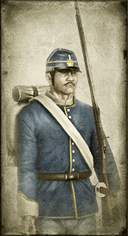
Basic Unit Statistics (can be modified by difficulty level, arts, skills, traits and retainers)
| Recruitment Cost | 1300 | |
| Upkeep Cost | 170 | |
| Melee Attack | 11 | 31% |
| Charge Bonus | 20 | 40% |
| Bonus vs Cavalry | 7 | 23% |
| Range | 125 | 19% |
| Accuracy | 65 | 65% |
| Reloading Skill | 60 | 60% |
| Ammunition | 15 | 18% |
| Melee Defence | 6 | 17% |
| Armour | 2 | 13% |
| Morale | 12 | 24% |
Strengths & Weaknesses
- Very good accuracy and reload rate.
- Good in melee.
- Presence encourages nearby friendly units.
- Very good morale.
Abilities
- Kneel Fire - The first rank of this unit will kneel to allow the first two ranks to fire simultaneously.
- Suppression Fire - This ability increases reload rate but lowers accuracy. Enemy units hit by suppression fire are slowed and suffer a morale penalty.
Requires
Description
The Republic must be defended by those willing to endure any hardship as they stand in line of battle.
Guard infantry fight in the same manner as all line infantry: by firing accurate volleys into the enemy, and doing so with unwavering discipline. The guard are trained to a very high standard, and have good reloading speeds and are good marksmen to boot. Their breech-loading rifles are capable of inflicting horrible wounds on anyone unlucky enough to be hit. As a result of their training and fighting spirit they have very good morale, and their unflappable attitude gives encouragement to nearby friendly units. Finally, in close combat they can give a good account of themselves but are vulnerable to artillery fire like any other men if positioned carelessly on the field. The short-lived Ezo Republic relied heavily on French military advisors to train and command its army. The Republic was crushed before it had chance to absorb all the lessons that French officers and NCOs could pass on. The French army was generally held to be the best at the time, and followed a doctrine of "attaque à outrance", "attack to excess", or possibly "attack without restraint". Such a battle philosophy would have found ready listeners in Japan. Had time and events allowed, the French would almost certainly have inculcated their tactical ideas into the Ezo army, and it is very likely that units organised, equipped and trained to be Japanese "poilu" or "hairy ones", the French slang for infantrymen, would almost certainly have appeared in battle. Frenchmen dreaming of dash, glory and bravery in the face of the enemy should have had a rude awakening in the Franco-Prussian War of 1870-1. They didn't wake up, unfortunately, and French troops were ordered forward in "attaque à outrance" against machine guns in the First World War.
